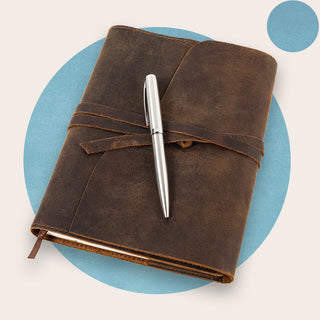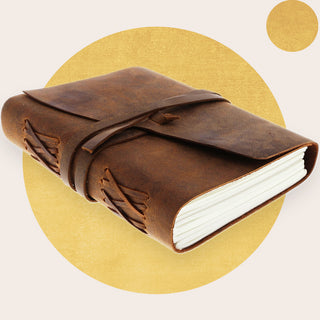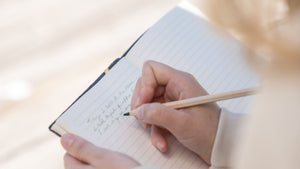Are you looking to properly start keeping your own diary? Want to learn how to write a diary properly so that you will keep up the habit and ensure that it stays in your routine?
Well, step forth and saddle up, as we explore what to write about, how to write about it, and how to keep a routine that will surely change your life.

Step 1: Brainstorming
- Firstly, it will be helpful to figure out something to write about.
- Try writing a diary entry about the events of your day, in as much or as little detail as you wish. The key to diary writing is to honor yourself, so only write as much as you can remember or as much as you wish to capture. This can be a digital diary or any other kind.
- Try keeping track of your long-term goals and working out how to achieve them. This might concern your mental health or anything of that ilk. Much akin to future-self journaling, this can be a great place to explore the future in all its form. Simply begin with a 'dear diary' and you will be well on your way.
- If you sometimes struggle to know your feelings, you can also try to capture your present mood or feelings on paper. This is one of the premier diary basics ideas that gets you thinking in the mode of the diary - i.e. searching within yourself for the answers rather than looking outside of yourself. You can then use these entries to create new entries based on what you need most or simply to know yourself a little better.
- If none of these aspects of diary entries or the writing process is immediately appealing to you, then you can take up what so many people do these days when writing an online diary. Why not start writing a whole heap of vapid inspirational quotes that will slowly fade and never achieve their purpose? Write entries of quotes from famous people, a favorite book or movie, or even an inspirational friend and/or family member. Record where this quote comes from and then explain why it is important to you in your own words.
- You can even use this opportunity in your digital journal (available on all iOS and Android devices) to just get a little excited about something that particularly interests you. Everyone is interested in something, so use this opportunity to explore what interests you and why, to get a deeper understanding of it and yourself.

Step 2: Writing Entries
Here are a few words of advice on how to write the entries themselves:
- It is worth being a little organized with your journaling practice and keeping track of the date. This is especially helpful if you keep a daily journal of personal goals and ambitions, though perhaps not as relevant on Android devices today. Before you write a diary entry on paper, make a note of the date (and perhaps even the time) in the corner of the page.
- Though this is your diary, it is best to enter each entry with a topic in mind, lest you go off track and write a bunch of short notes on your favorite subjects that lacks direction or meaning. This might be your intention, in which case, bravo! But it is more often the desire to keep it concise. After all, you are probably a pretty busy person, eh?
- A classic way to start an entry is by writing 'dear diary', and though Hollywood has taken every opportunity to mock this method, it still works. In fact, it can add quite a confessional lilt to a medium that might otherwise just feel like an echo chamber. Don't hesitate to use this phrase if you feel it might be of use to you.
- In a similar way, it is best to write in the first person as yourself. The idea, after all, is for the diary to be a personal place to explore your life, whether in bullet points or fully-fledged prose. This is your place to be as selfish and as self-centered as possible, to save inflicting it upon the people around you.
- In this way, you should try to be as honest as possible in your diary. This is a confessional place, much like the booth in a church, and in the same way, you can admit here anything that you might not otherwise admit to those around you. Record any emotions or thoughts that you have that you would not like others to know of. In doing so, you can begin to process them and let them go.
- Something that the more adept diary keepers will tell you is not to worry too much about spelling and grammar. Much as in one of the premier journaling techniques, automatic writing, you should try to write as quickly as possible to override the inhibition response in your mind that might try to prevent you from being as honest as you might otherwise be. This includes the spelling and grammar checkers that are so inherently active whenever you are writing something.
- Likewise, though, as fast as you might wish to write your diary entries, it is important to at least consider that these entries might one day be the authoritative source on a person, time, and/or place. Thus, you should try to include as much detail as possible so that the moments can be preserved in time and allow you to better recall them in the future. These do not have to be wholly accurate as much as they should be accurate depictions of the way you felt about them.
Step 3: Routine
What links all the different forms of diary writing is the need to get into a routine with it...
- The most important thing is to try and find a specific time each day that you are going to be free enough to dedicate the time to write a diary entry. This doesn't have to be adhered to every single day, but the more often it is kept up with, the more complete the picture of your world will be as captured through the diary.
- Don't overwork yourself in the beginning and leave a bad taste in your mouth for the future. Start out writing small amounts and for shorter periods of time. Doing so for 10-15 minutes at first is a great place to start, only keeping track of your most pressing feelings and thoughts. You can be more thorough later down the line.
- Something to bear in mind is that this doesn't have to be something that you are strict about. You don't have to just write your thoughts, you can also draw them or collage them, or capture them in another way!

Final Words
So, there you have it! Hopefully, you are now feeling ready and able to get started writing your own diary!
FAQs How to Write a Diary
WHAT SHOULD I WRITE IN A DIARY?
Anything you wish! The idea of a diary is that it should be as personal as possible. In this way, you should try to keep it as personal as possible, aligned with your own needs and visions.
WHAT IS A DIARY FORMAT?
A diary is a type of journal that is more concerned with the day-to-day minutiae of life. Typically, a diary will be kept every day, worked into a routine which will eventually reap the benefits of having carved out a specific time of day for writing and keeping track of the flow of time.
WHAT IS AN EXAMPLE OF A DIARY ENTRY?
Though much mocked in big-budget movies, the 'dear diary' start of a diary entry is altogether rather effective, especially at achieving a more confessional kind of tone reminiscent of a confessional booth at church.
WHAT ARE THE 3 ELEMENTS OF DIARY WRITING?
These can be incredibly different and personal based on your own needs and wants, though they typically revolve around 1) getting a firm idea of what you want to write about, 2) learning how to write and what to write, and 3) keeping it in as firm a routine as possible.



